Belgium: Rise of the Choco Lords
- Thread starter Selzro
- Start date
-
We have updated our Community Code of Conduct. Please read through the new rules for the forum that are an integral part of Paradox Interactive’s User Agreement.
You are using an out of date browser. It may not display this or other websites correctly.
You should upgrade or use an alternative browser.
You should upgrade or use an alternative browser.
Meanwhile, in 1907 the first Belgian dreadnought, ‘Leopold I’ was launched in Bruges
in Bruges
Hmmm. I suppose an appropriate place considering. Nice work at war.
Chapter VIII
Belgian South American policy continued in the late 1910s with an invasion of Ecuador, the largest coca producer outside of Belgian control. Operations lasted for less than a year, in 1919, and at the end Belgium acquired Ecuadorian Pastaza.
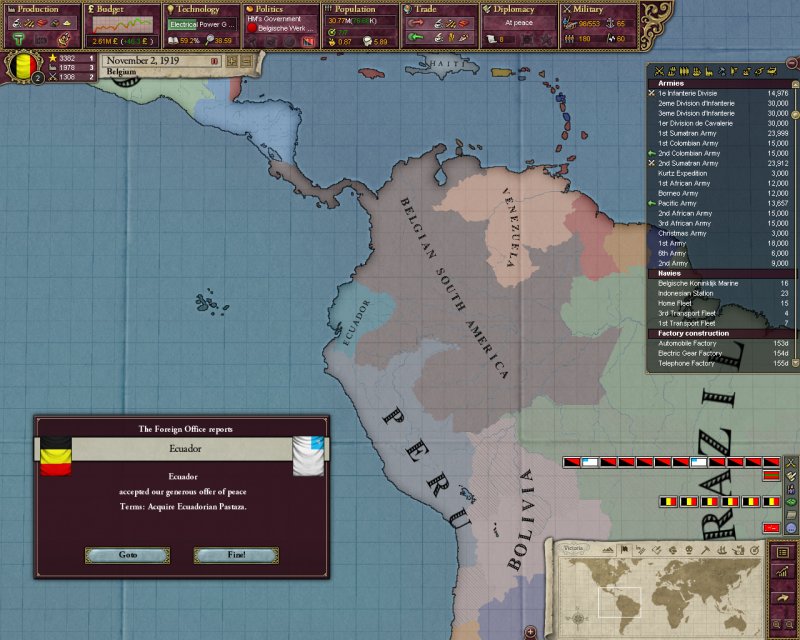
After that, all major combat operations were halted for recuperation and reorganization, but external factors would not let that state of affairs last for long. Brazil, recently humbled by its defeat by Belgium, decided to revenge an older loss, the Argentinean conquest of Rio Grande do Sul. War was declared in October 1921, days later Belgium joined in support of its Argentinean ally, and by November France was once again invading Belgium to support its Brazilian ally. The war lasted less than nine months, and was fought in South America, Africa and Europe, but mostly in the latter theatre where a Dutch and North German intervention swept aside the French armies and forced them to ask for a white peace.
Confident after its victory, the Belgian government once again turned its attention to Ecuador, which the Company was accusing of increasing cocoa supply despite its warnings. In January 1926 Ecuador was invaded, and it had been annexed in time for Christmas. Having secured dominance in South America, colonization efforts were directed at the Pacific islands, where it was said that the natives could be particularly suited to work in the chocolate factories.
Scarcely half a year had passed when Brazil, betting on France’s increased military power, initiated the 2nd Brazilian Liberation of Rio Grande do Sul. By 1927, new regiments had been raised in Belgium, offering an unbreakable front against French attacks.
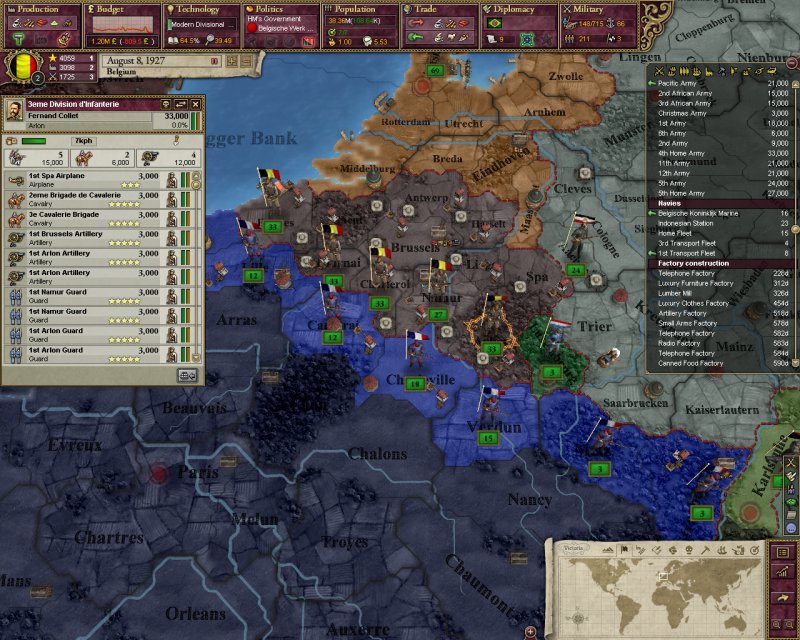
After the North German Federation was called to assist, the war took a predictably sour turn for France, and by the end of the year Belgian troops were besieging Paris.
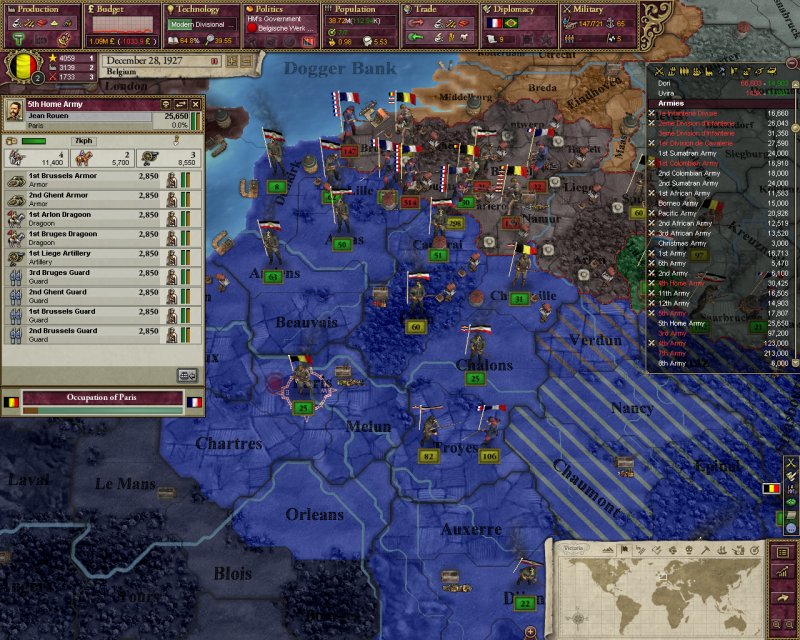
The French accepted a white peace a few months later, but that war showed two weaknesses of the Belgian military. The French navy, while among the most advanced in the world, had become outnumbered by the French one, and was forced to abstain from offensive action during most of the war. A dreadnought construction plan was initiated to remedy that. Second, Africa had proven impossible to defend. In recent years, France had colonized all its regions north and west of Belgian Africa and had also annexed Egypt. The French-Belgian border in Africa had thus become immense, and the French could use their numerical superiority to expand deep into Belgian territory, while the few Belgian armies struggled to defend against selected enemy armies. That was a problem the current, socialist administration seemed unable to tackle.
What’s more, Belgium faced an economic problem due to rising numbers of factory workers and unprofitable factories, which had to be maintained solely to avoid unemployment. By the early 1930s, the Belgian treasury was in decline, France was growing stronger by the month with a speed that defied explanation and Belgium seemed stagnant. The only bright note was the new-found appreciation of certain overseas nations for Belgium’s role in the world, but that appreciation only served to heighten the feeling among the Company’s Gentlemen that Belgium’s civilizing mission in the world was been sabotaged, by internal and external enemies.
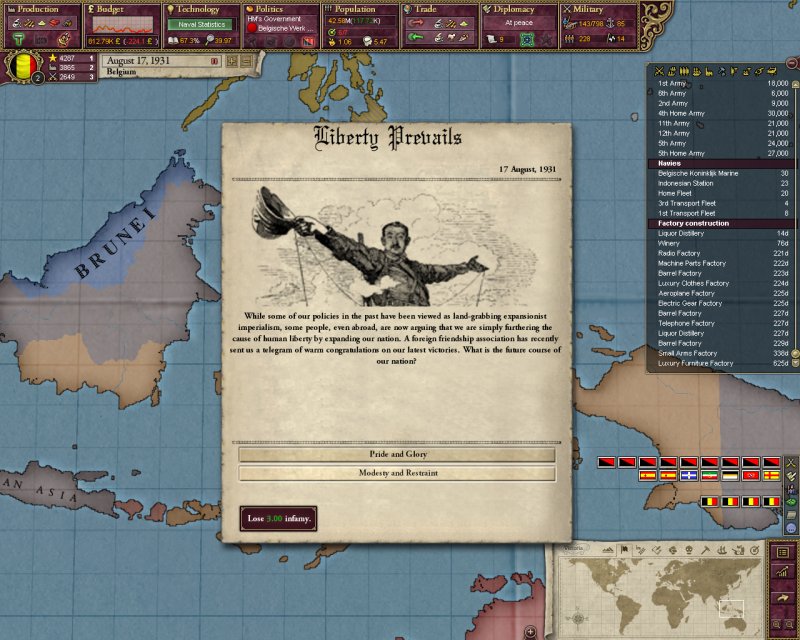
One such Gentleman, who in his youth had been an admirer of the idealist Mr. Kurtz and had subsequently studied his recovered notes and had written some sage articles analyzing them, addressed his fellow share-holders in that same wing of the central offices where almost a century ago the Belgian Chocolate Empire was formulated.
“Gentlemen, our nation is in crisis. We all know it, although the way this crisis crept upon us was so gradual and imperceptible that only few among us dared to play the role of Cassandra, until so very recently, when it all became clear. And it has all become clear. We have been pitted against the French, by outside influences that tried to remain hidden. And I do not, of course, allude to Brazil – for how could such a troubled, underdeveloped nation dare to dictate the actions of great powers. No, Gentlemen, far more sinister forces are at work, have been at work for possibly much longer than we’d dare to admit. There is, living among us, but also scattered around the world, wherever money is to be made, a class of people who are totally opposed to our enterprise. A class of people, smug in their perceived superiority, who control the wealth of nations and conspire to take away from us Belgians all that we have accomplished. A people who are our natural enemies, and yet have never met us in battle, preferring to let the French, or Brazilians or our own corrupted socialist politicians do their bidding.”
“You don’t mean…”, another Gentleman ventured, afraid to continue his phrase.
“Yes. I believe you all know to whom I am referring. They are the nemesis of the Belgian Chocolate Empire, and will not rest until we have been brought down and they have risen in our place. They are… the Swiss!”
(To be concluded…)
Belgian South American policy continued in the late 1910s with an invasion of Ecuador, the largest coca producer outside of Belgian control. Operations lasted for less than a year, in 1919, and at the end Belgium acquired Ecuadorian Pastaza.

After that, all major combat operations were halted for recuperation and reorganization, but external factors would not let that state of affairs last for long. Brazil, recently humbled by its defeat by Belgium, decided to revenge an older loss, the Argentinean conquest of Rio Grande do Sul. War was declared in October 1921, days later Belgium joined in support of its Argentinean ally, and by November France was once again invading Belgium to support its Brazilian ally. The war lasted less than nine months, and was fought in South America, Africa and Europe, but mostly in the latter theatre where a Dutch and North German intervention swept aside the French armies and forced them to ask for a white peace.
Confident after its victory, the Belgian government once again turned its attention to Ecuador, which the Company was accusing of increasing cocoa supply despite its warnings. In January 1926 Ecuador was invaded, and it had been annexed in time for Christmas. Having secured dominance in South America, colonization efforts were directed at the Pacific islands, where it was said that the natives could be particularly suited to work in the chocolate factories.
Scarcely half a year had passed when Brazil, betting on France’s increased military power, initiated the 2nd Brazilian Liberation of Rio Grande do Sul. By 1927, new regiments had been raised in Belgium, offering an unbreakable front against French attacks.

After the North German Federation was called to assist, the war took a predictably sour turn for France, and by the end of the year Belgian troops were besieging Paris.

The French accepted a white peace a few months later, but that war showed two weaknesses of the Belgian military. The French navy, while among the most advanced in the world, had become outnumbered by the French one, and was forced to abstain from offensive action during most of the war. A dreadnought construction plan was initiated to remedy that. Second, Africa had proven impossible to defend. In recent years, France had colonized all its regions north and west of Belgian Africa and had also annexed Egypt. The French-Belgian border in Africa had thus become immense, and the French could use their numerical superiority to expand deep into Belgian territory, while the few Belgian armies struggled to defend against selected enemy armies. That was a problem the current, socialist administration seemed unable to tackle.
What’s more, Belgium faced an economic problem due to rising numbers of factory workers and unprofitable factories, which had to be maintained solely to avoid unemployment. By the early 1930s, the Belgian treasury was in decline, France was growing stronger by the month with a speed that defied explanation and Belgium seemed stagnant. The only bright note was the new-found appreciation of certain overseas nations for Belgium’s role in the world, but that appreciation only served to heighten the feeling among the Company’s Gentlemen that Belgium’s civilizing mission in the world was been sabotaged, by internal and external enemies.

One such Gentleman, who in his youth had been an admirer of the idealist Mr. Kurtz and had subsequently studied his recovered notes and had written some sage articles analyzing them, addressed his fellow share-holders in that same wing of the central offices where almost a century ago the Belgian Chocolate Empire was formulated.
“Gentlemen, our nation is in crisis. We all know it, although the way this crisis crept upon us was so gradual and imperceptible that only few among us dared to play the role of Cassandra, until so very recently, when it all became clear. And it has all become clear. We have been pitted against the French, by outside influences that tried to remain hidden. And I do not, of course, allude to Brazil – for how could such a troubled, underdeveloped nation dare to dictate the actions of great powers. No, Gentlemen, far more sinister forces are at work, have been at work for possibly much longer than we’d dare to admit. There is, living among us, but also scattered around the world, wherever money is to be made, a class of people who are totally opposed to our enterprise. A class of people, smug in their perceived superiority, who control the wealth of nations and conspire to take away from us Belgians all that we have accomplished. A people who are our natural enemies, and yet have never met us in battle, preferring to let the French, or Brazilians or our own corrupted socialist politicians do their bidding.”
“You don’t mean…”, another Gentleman ventured, afraid to continue his phrase.
“Yes. I believe you all know to whom I am referring. They are the nemesis of the Belgian Chocolate Empire, and will not rest until we have been brought down and they have risen in our place. They are… the Swiss!”
(To be concluded…)
Hehe, I was wonderin gwhen there would be something about the Swiss in this chocolate themed AAR. When it's about banks, watches or chocolates, you can't get around the Swiss. Evil plotters 
Yes, I realized I just had to get the Swiss in this story, but now the challenge is to deal with them before the time runs out. Expect the next chapter soon.
Chapter IX
“You can’t be serious!” a certain Gentleman with known internationalist sympathies exclaimed.
“I am afraid I am. I turn your attention to this document, unearthed by agents of our Company in the lodgings of a Swiss agent under remarkable circumstances.”
He produced copies of a treatise titled ‘Protocols of the Chocolate Guild Masters of Matterhorn’.
“In here, the Swiss Masters detail their plans of world domination of the chocolate industry. It is a most nefarious plot, and I am afraid that we, and we alone, are able to stop it at this historical juncture.”
“But what is there to be done with this… Swiss problem?” a more patriotic Gentleman asked.
“The Company, for all its influence and wealth, is not powerful enough to directly confront such forces. If we are to act, it must be through our government in a concerted way. The socialists currently in office have proven themselves unfit for their station, complacent or even outright traitorous. The old parties, liberals and conservatives, are long past their prime and cling to outdated ideas and methods. We need a third way to guide our nation through these dangerous times, and direct the forces at our disposal against the true enemies of all that we stand for.”
“There is already a party professing a ‘third way’…”
“Well known to me and to many of us. They are patriots who are not unsympathetic to our cause. I believe a couple of Gentlemen in this room are affiliated with them already. They appear to be the perfect instrument for our historical role, if only His Majesty would be persuaded to instate them in government…”
“Do not worry about that”, a wrinkled, old Gentleman and former representative of the state said, in a trembling voice, “we will have His Majesty’s cooperation, as we have always had. Our interests are the interests of the nation.”
“Is he still alive?” someone whispered to the Gentleman sitting next to him.
“I’ve heard it said that his father or grandfather was a founding member of the Company, though I wouldn’t be surprised if it’s been him all along.” the other Gentleman replied in a whisper. “In any case, he is a very old friend of the royal family. Very, very old friend…”
“Then we are decided?”
“Belgium has decided.”
In January 1932, the Fascist Partji was sworn into office, directly appointed by His Majesty. Its first step was to enact a 12 hour workday, down from the previous 14 hour one, and it announced a series of further social reforms to be implemented gradually in the next few years. Militancy and consciousness were down all across the empire. Immediately after that, a steep military buildup was initiated. In addition to the five home armies, three new, smaller ones, were created with the specialized, though secret, task of moving quickly and occupying a certain mountainous country. Special attention was given to the air force, and those small armies had more air support relative to their strength than any before them. In Africa, over a hundred new brigades were created or transferred from Sumatra to fortify the continent from French attacks. No money or time was spared in that effort, and by the end of the year crack armies formed a solid front all across the Franco-Belgian African frontier.
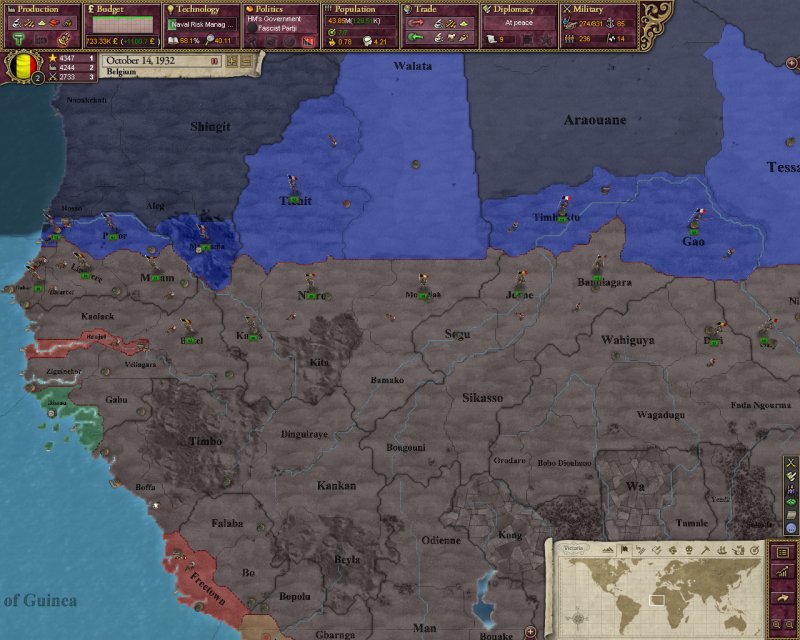
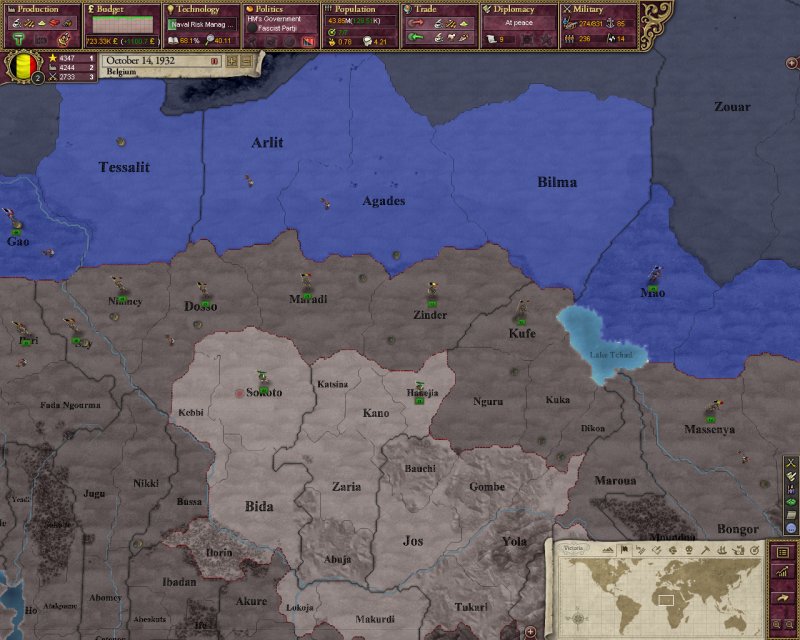
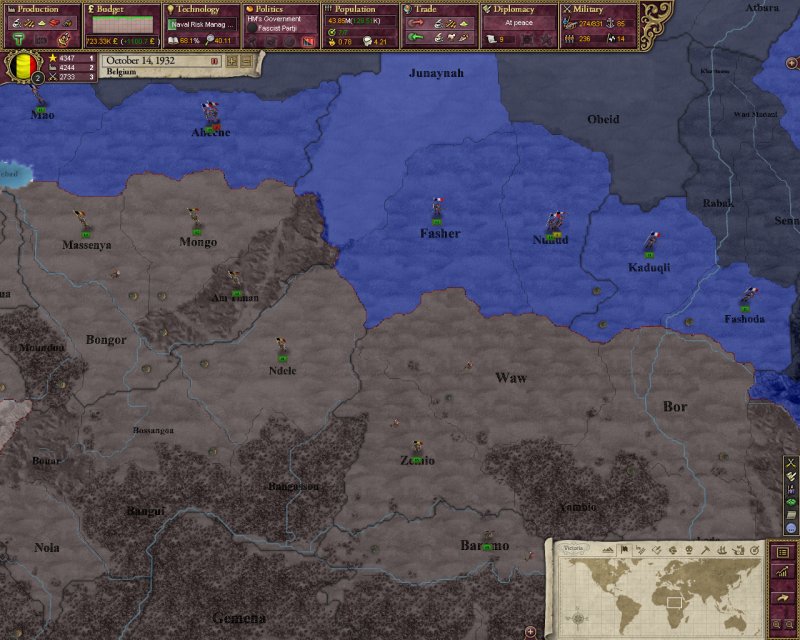
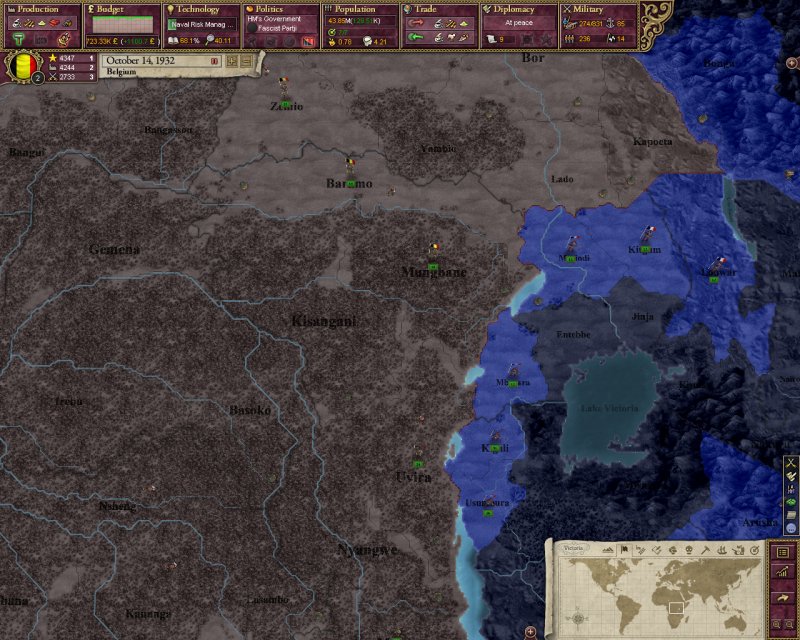
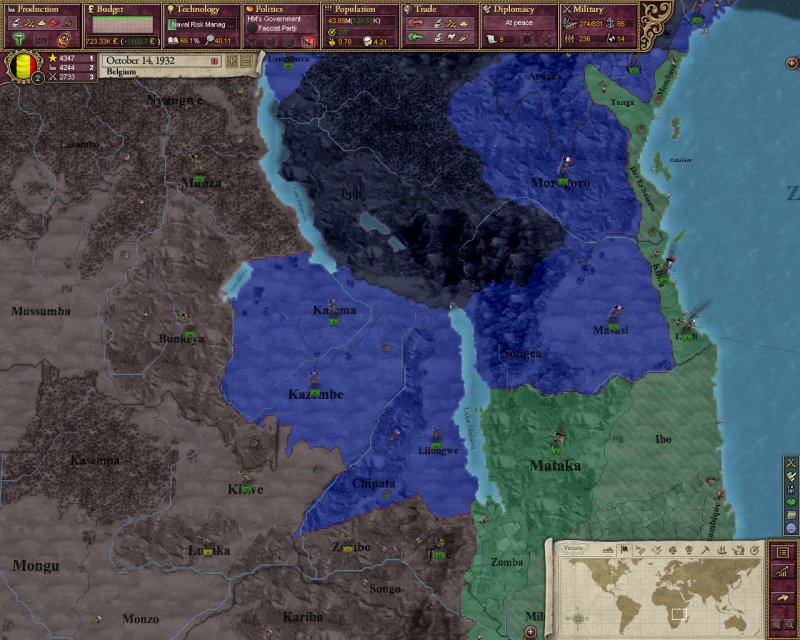
For a few more months after that Belgium tended to its diplomatic relations, to make sure that all key alliances were solidified and ready to be called in time of war. Finally, on 18 July 1933, a declaration of war was sent to Switzerland, with a ‘cut down to size’ demand. France joined its Swiss masters immediately, and North Germany and the Netherlands were promptly called to assist Belgium. The War to End All Wars (that concern chocolate) had begun.
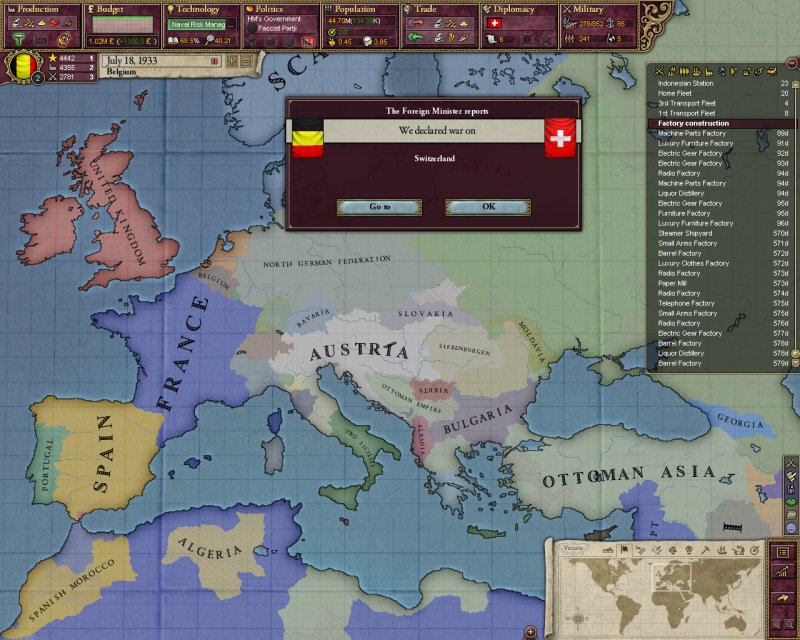
The plan was simple. While the bulk of continental French forces were engaged in the Franco-Belgian border, the more mobile new armies would maneuver through Alsace into Switzerland, before the Swiss could mobilize their defences. North German forces were expected to subsequently follow, maintaining supply with allied lines. Meanwhile, in South America the Belgian armies would invade French Guiana and in Africa the long line would be held against any and all French assaults, followed by counterattacks into French territories. 10 days into the war, the Swiss part of the plan was already coming into effect.
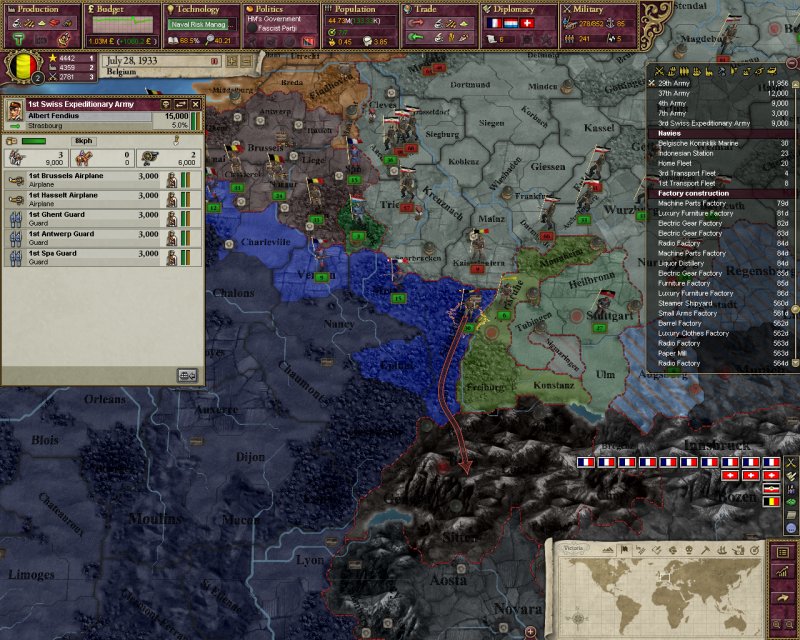
However, Swiss and French armies scrambled to intercept the Belgian offensive, attacking before the Belgians could get into Switzerland.
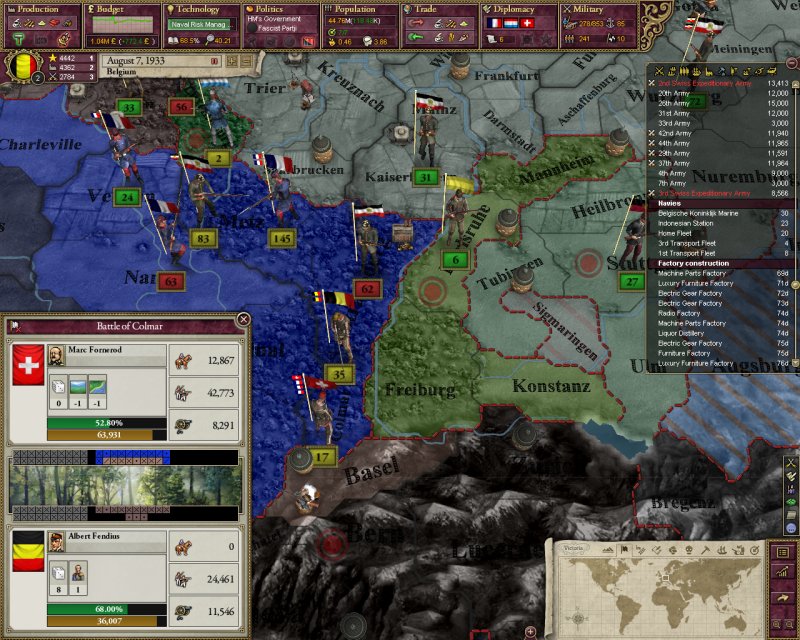
Meanwhile, in Africa, the line seemed to hold, and Belgian superiority in tactics and equipment (all land techs researched) showed against the masses of French conscripts. Exactly two months after the declaration of war, the first great victory was won, when the bigger of the two Swiss armies was annihilated by Belgian and German troops. There was much rejoicing at this blow dealt against the nefarious chocolate puppet masters!
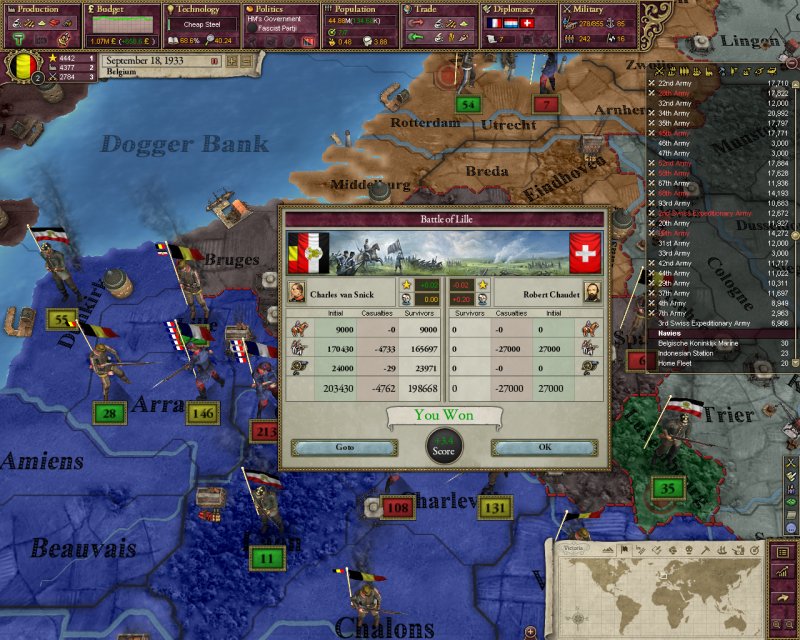
Switzerland itself was still out of reach, but the French armies were losing ground in France, getting close to surrendering in French Guiana and were, if not outright losing, certainly far from winning in Africa. Gradually, in the latter theater, the situation developed as follows: Containment of most of the attacks in the west coast, with some strategic maneuvers north and south of the line by both Belgian and French forces; Belgian advance in the north, where large numbers of French brigades became bogged down trying to displace them; French advance in the unprotected north-east provinces, only to be repelled by Belgian counterattacks once other fronts were stabilized; Stubborn defence in the jungles of the east, where natural barriers made it easier for a single Belgian army – the old Sumatran Army, brought in for that task, to hold off all French advances; counterattack in the south-east, where after the initial French attacks were routed, the Belgian armies converged into French territory, only to be attacked by whatever the French could find to throw at them; and finally some chaotic lesser battles around French Grand Lahaou, that ended in Belgian victory.
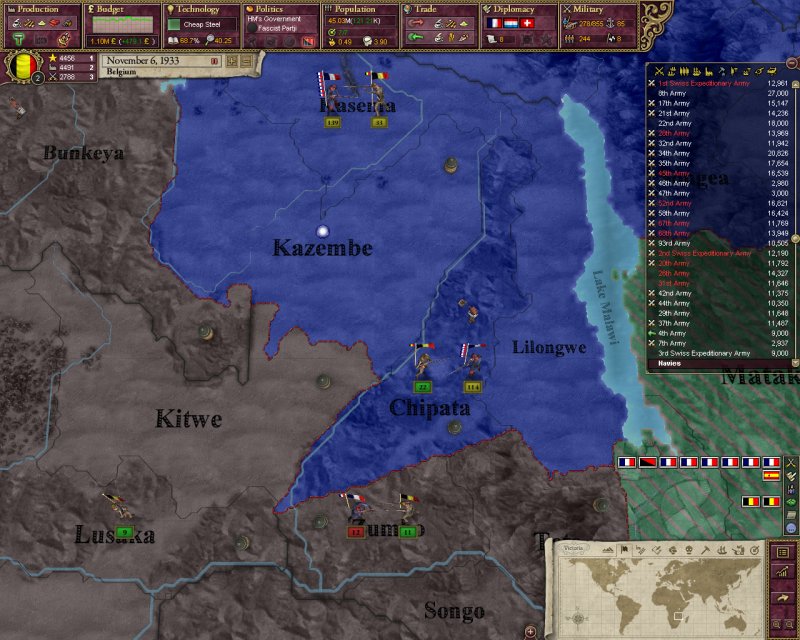
In mid-November, the 5th Home army, having punched through French defences, managed to reach Switzerland from behind enemy lines.
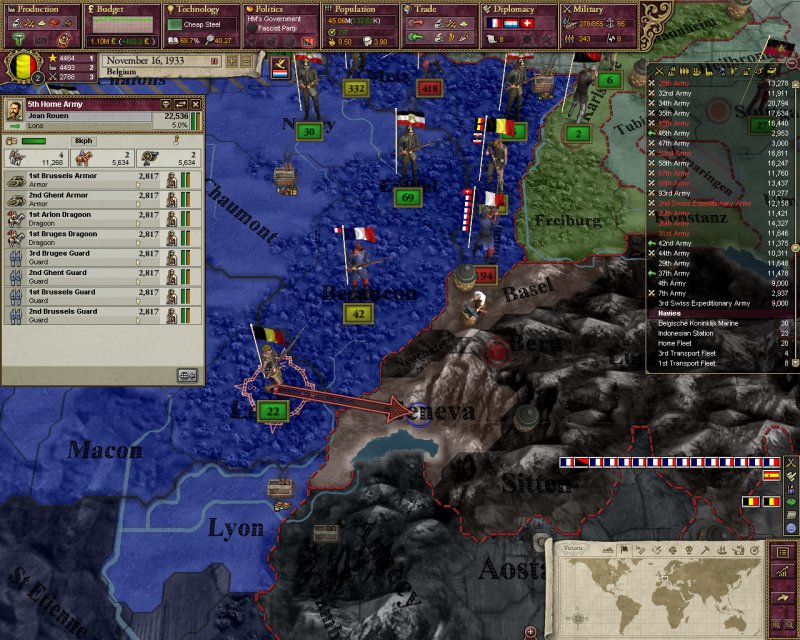
Having accomplished that, the French expeditionary armies were able to detach themselves from the battle in Alsace and move into Switzerland, where together with the 5th Army they proceeded to occupy the enemy territory and plunder the enemy chocolate making facilities. In mid December, the war in South America took an unexpected turn, when French transports managed to sneak past the Belgian Navy and landed troops in Belgian Venezuela. The transports were promptly hunted down and sunk by the 20 dreadnoughts and 10 cruisers guarding the region, while two Belgian armies engaged the French before they could complete their occupation of their beachhead.
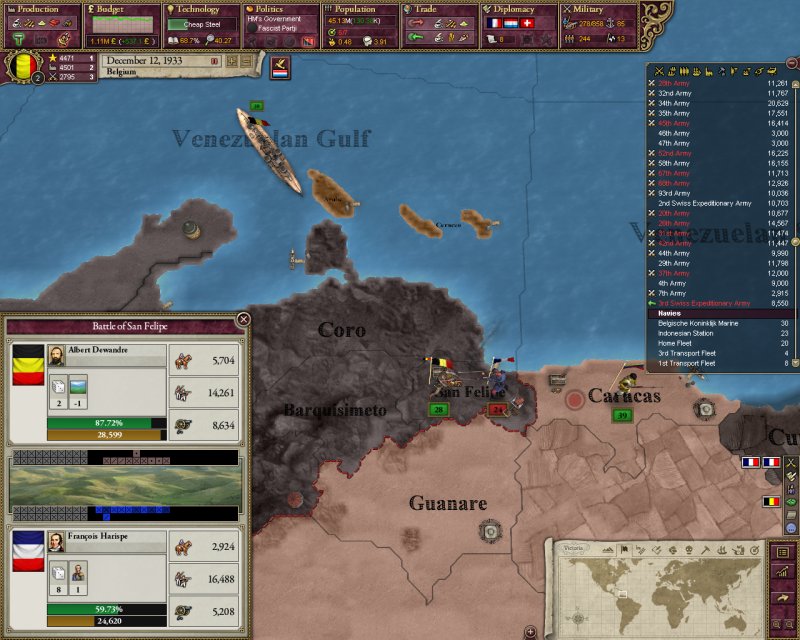
January 1934 saw advances in all fronts, while in late February Swiss partisans launched a sneak attack on the Belgian occupation forces. That was clearly the last card of the Swiss counter-Company, the ‘Toblerone Defence’ as it came to be called by Belgian generals, and for a while it seemed to be causing significant casualties to the, already wearied with attrition, Belgian armies.
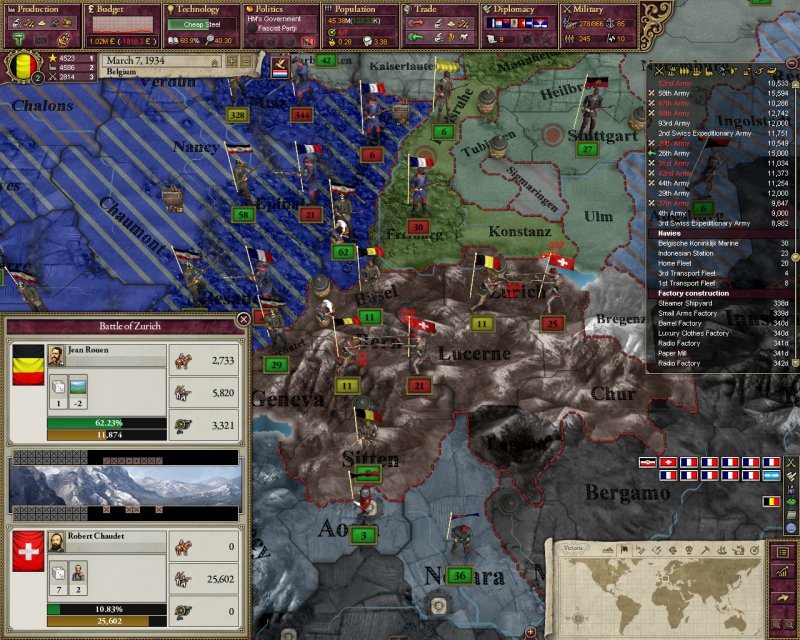
When that failed, France, playing its own last card, called upon all its remaining allies to render whatever help they could. From neighbouring Baden and Sardinia-Piedmont to tiny Montenegro, they came to help France and Switzerland in their final hour, they came and were defeated.
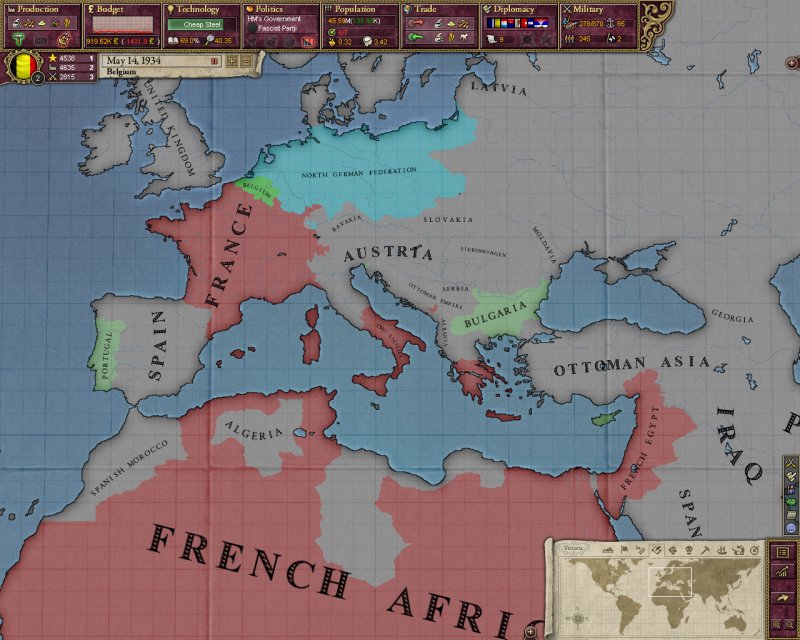
By late April, all resistance in French Guiana had surrendered, while a Sicilian attempt to land troops in Colombia ended in disaster for them. In mid May, Bern was in Belgian hands and most of France had fallen.
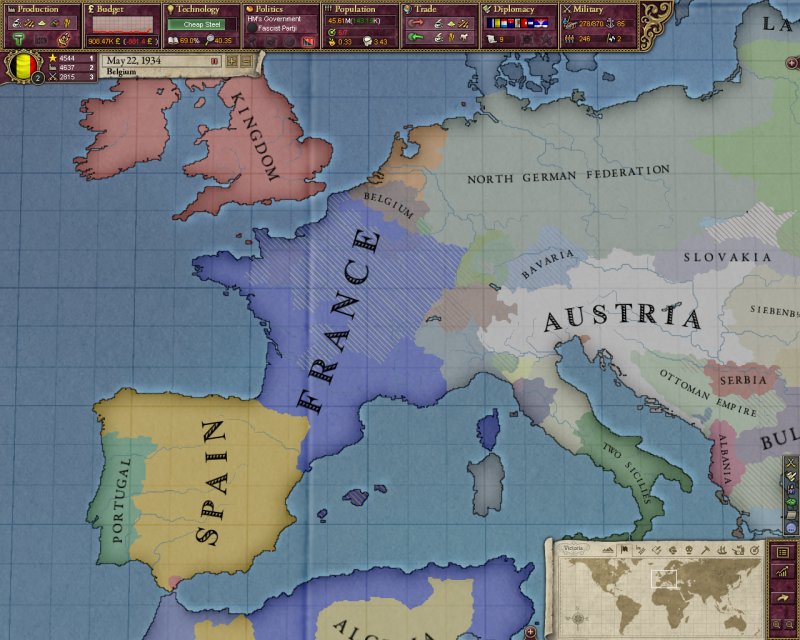
On 12 June 1934, the War to End All Wars was officially over. Switzerland conceded its defeat, agreeing to pay war reparations, hand over its chocolate patents to Belgium and have its remaining facilities inspected, while its top chocolatiers were whisked off to Belgium, so their talents could be put to better use by the Company. France ceded Alsace-Lorraine to the North German Federation and French Grand Lahaou to Belgium, thus losing all cacao plantations in western Africa.
Belgium emerged triumphant from the war, without the loss of a single brigade (although casualties in some operations had been high). However, the economy, having taken a downward turn at the start of the war, showed no signs of improving once there was peace, and that prompted a liberal victory in the elections of January 1935. The Fascist Party, in an unexpected turn of events, deemed that the will of the people could not be trusted, after such an electoral outcome, and refused to abandon its ruling government position. His Majesty seemed fine with that, and most of the people appeared strangely satisfied with that decision, according to subsequent government polls. At the Company headquarters, in the heart of Belgium’s Chocolate empire and its very imperialistic soul, the Gentlemen celebrated their great victory and the place they had attained in history.
“Very well done! I say, this must very well have been Belgium’s finest hour!”
“Yes, indeed! Our finest hour… History will look most favourably upon us.”
“We are the heroes of our generation!”
“A toast!”
“To chocolate! May it forever flow!”
“Hear, hear!”
“About that, history, when do you think it will all come out to the public?”
“You mean a Company history? Well, that’s a bit difficult at this moment. Any historical publication must now be approved by the Fascist Party. I hear the procedure is somewhat strict… with heavy editorial changes…”
“Oh really? Surely they exaggerate. The Fascists are patriots. And furthermore, they will never forget we put them where they are now! I’m sure there is nothing to worry about.”
“Yes, I’m sure they’ll never forget the debt they owe to the Company for everything they’ve attained. They wouldn’t be ungrateful!”
“Or unreasonable.”
“Right. Gentlemen, to our victory! And… to the Party…”
A cheer rather less enthusiastic than last time went up from the small crowd, who sipped their hot chocolate in contemplation, and a few suppressed worried frowns. While outside, all around them, the whited sepulcher of the capital city seemed to entomb the secret history of a new world that was being born, the world of the 20th Century.
Epilogue
The Belgian Chocolate Empire, in 1936 (areas of direct rule):
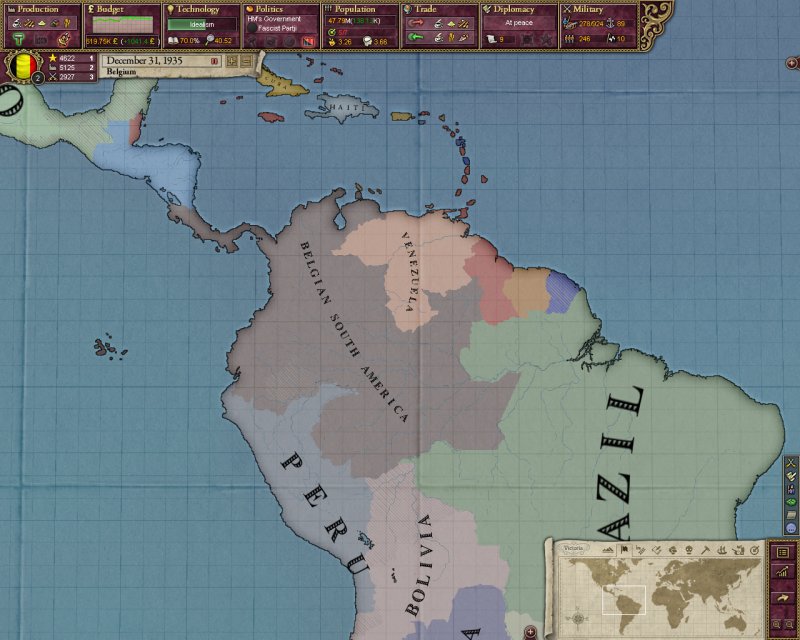
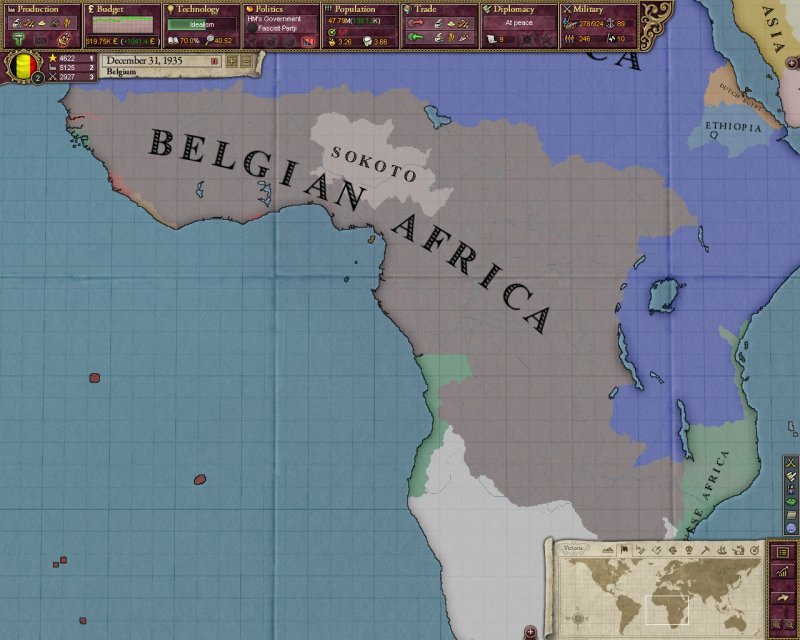
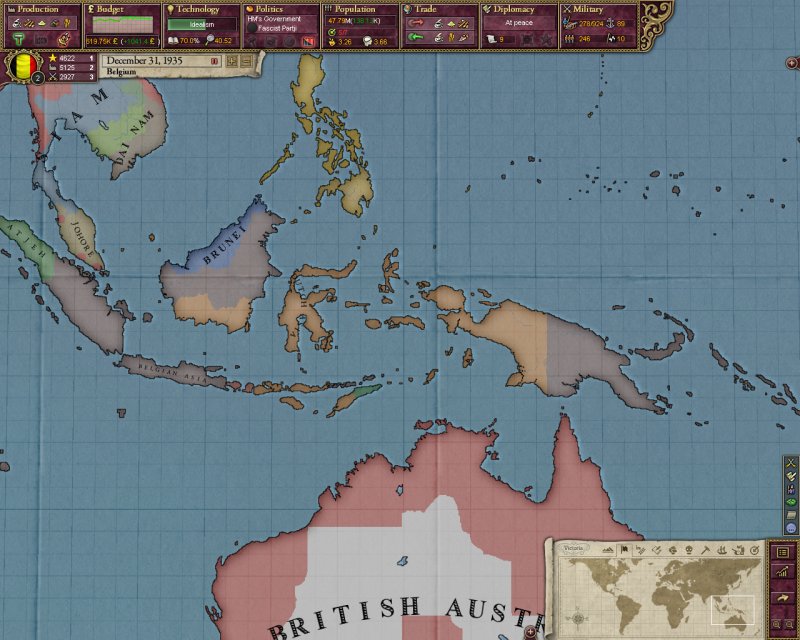
Europe and Northern Africa, in 1936:
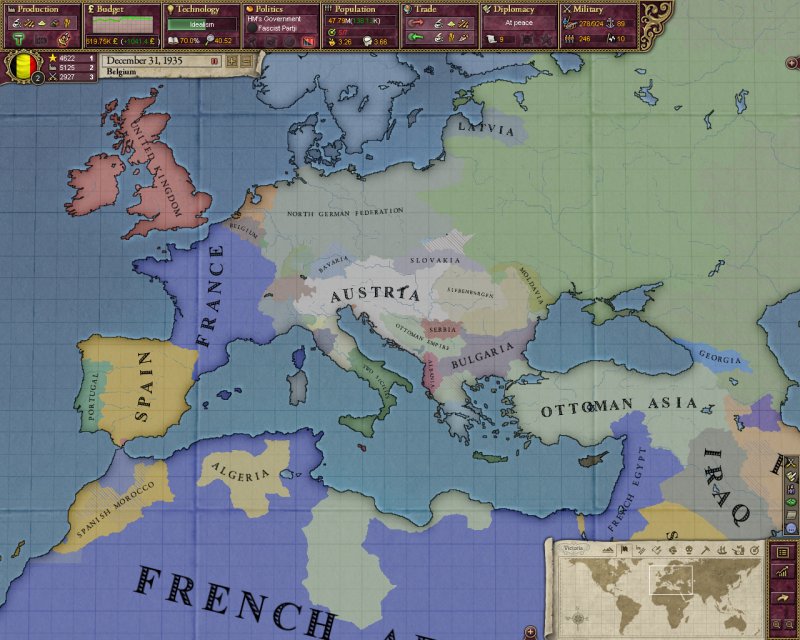
The state of nations, on 1 January 1936:
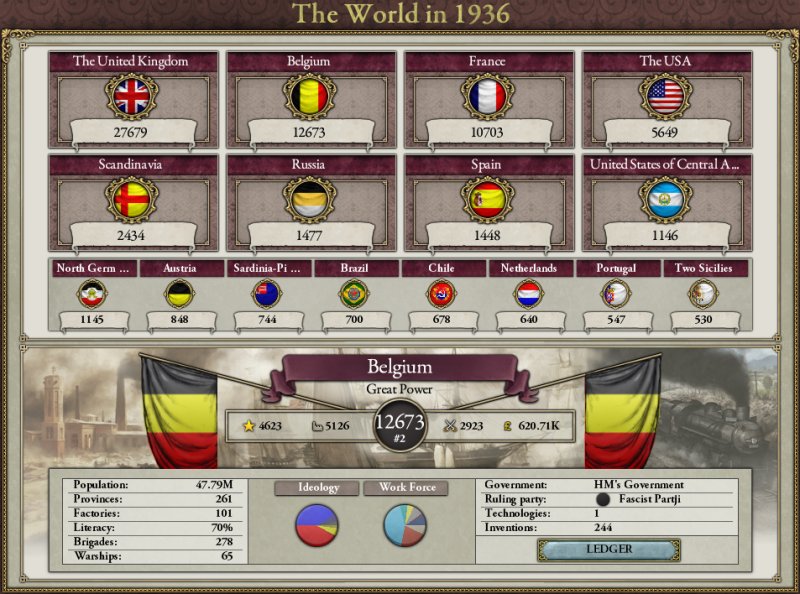
The world in 1936:
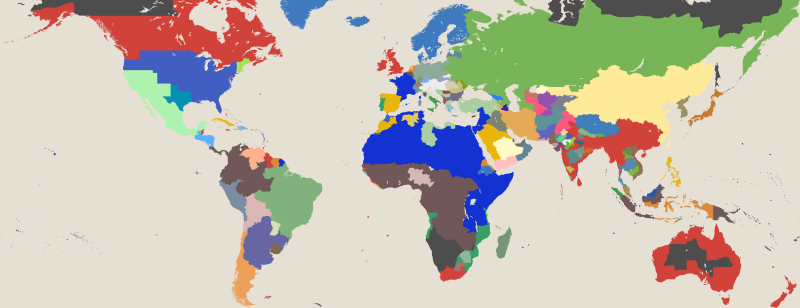
The Belgian Empire and its sphere of influence, 1936:
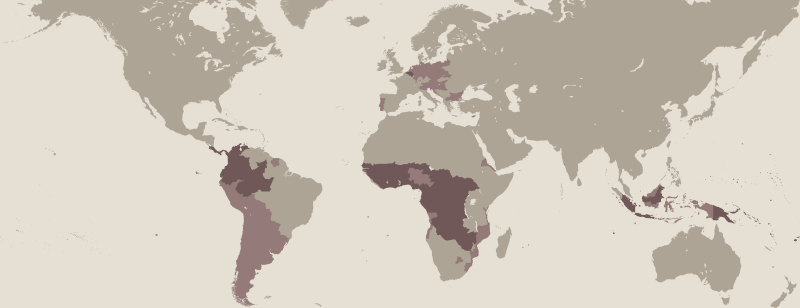
"He who controls the chocolate controls the world.
But can he control himself?"
- The Walloon Irony
“You can’t be serious!” a certain Gentleman with known internationalist sympathies exclaimed.
“I am afraid I am. I turn your attention to this document, unearthed by agents of our Company in the lodgings of a Swiss agent under remarkable circumstances.”
He produced copies of a treatise titled ‘Protocols of the Chocolate Guild Masters of Matterhorn’.
“In here, the Swiss Masters detail their plans of world domination of the chocolate industry. It is a most nefarious plot, and I am afraid that we, and we alone, are able to stop it at this historical juncture.”
“But what is there to be done with this… Swiss problem?” a more patriotic Gentleman asked.
“The Company, for all its influence and wealth, is not powerful enough to directly confront such forces. If we are to act, it must be through our government in a concerted way. The socialists currently in office have proven themselves unfit for their station, complacent or even outright traitorous. The old parties, liberals and conservatives, are long past their prime and cling to outdated ideas and methods. We need a third way to guide our nation through these dangerous times, and direct the forces at our disposal against the true enemies of all that we stand for.”
“There is already a party professing a ‘third way’…”
“Well known to me and to many of us. They are patriots who are not unsympathetic to our cause. I believe a couple of Gentlemen in this room are affiliated with them already. They appear to be the perfect instrument for our historical role, if only His Majesty would be persuaded to instate them in government…”
“Do not worry about that”, a wrinkled, old Gentleman and former representative of the state said, in a trembling voice, “we will have His Majesty’s cooperation, as we have always had. Our interests are the interests of the nation.”
“Is he still alive?” someone whispered to the Gentleman sitting next to him.
“I’ve heard it said that his father or grandfather was a founding member of the Company, though I wouldn’t be surprised if it’s been him all along.” the other Gentleman replied in a whisper. “In any case, he is a very old friend of the royal family. Very, very old friend…”
“Then we are decided?”
“Belgium has decided.”
In January 1932, the Fascist Partji was sworn into office, directly appointed by His Majesty. Its first step was to enact a 12 hour workday, down from the previous 14 hour one, and it announced a series of further social reforms to be implemented gradually in the next few years. Militancy and consciousness were down all across the empire. Immediately after that, a steep military buildup was initiated. In addition to the five home armies, three new, smaller ones, were created with the specialized, though secret, task of moving quickly and occupying a certain mountainous country. Special attention was given to the air force, and those small armies had more air support relative to their strength than any before them. In Africa, over a hundred new brigades were created or transferred from Sumatra to fortify the continent from French attacks. No money or time was spared in that effort, and by the end of the year crack armies formed a solid front all across the Franco-Belgian African frontier.





For a few more months after that Belgium tended to its diplomatic relations, to make sure that all key alliances were solidified and ready to be called in time of war. Finally, on 18 July 1933, a declaration of war was sent to Switzerland, with a ‘cut down to size’ demand. France joined its Swiss masters immediately, and North Germany and the Netherlands were promptly called to assist Belgium. The War to End All Wars (that concern chocolate) had begun.

The plan was simple. While the bulk of continental French forces were engaged in the Franco-Belgian border, the more mobile new armies would maneuver through Alsace into Switzerland, before the Swiss could mobilize their defences. North German forces were expected to subsequently follow, maintaining supply with allied lines. Meanwhile, in South America the Belgian armies would invade French Guiana and in Africa the long line would be held against any and all French assaults, followed by counterattacks into French territories. 10 days into the war, the Swiss part of the plan was already coming into effect.

However, Swiss and French armies scrambled to intercept the Belgian offensive, attacking before the Belgians could get into Switzerland.

Meanwhile, in Africa, the line seemed to hold, and Belgian superiority in tactics and equipment (all land techs researched) showed against the masses of French conscripts. Exactly two months after the declaration of war, the first great victory was won, when the bigger of the two Swiss armies was annihilated by Belgian and German troops. There was much rejoicing at this blow dealt against the nefarious chocolate puppet masters!

Switzerland itself was still out of reach, but the French armies were losing ground in France, getting close to surrendering in French Guiana and were, if not outright losing, certainly far from winning in Africa. Gradually, in the latter theater, the situation developed as follows: Containment of most of the attacks in the west coast, with some strategic maneuvers north and south of the line by both Belgian and French forces; Belgian advance in the north, where large numbers of French brigades became bogged down trying to displace them; French advance in the unprotected north-east provinces, only to be repelled by Belgian counterattacks once other fronts were stabilized; Stubborn defence in the jungles of the east, where natural barriers made it easier for a single Belgian army – the old Sumatran Army, brought in for that task, to hold off all French advances; counterattack in the south-east, where after the initial French attacks were routed, the Belgian armies converged into French territory, only to be attacked by whatever the French could find to throw at them; and finally some chaotic lesser battles around French Grand Lahaou, that ended in Belgian victory.

In mid-November, the 5th Home army, having punched through French defences, managed to reach Switzerland from behind enemy lines.

Having accomplished that, the French expeditionary armies were able to detach themselves from the battle in Alsace and move into Switzerland, where together with the 5th Army they proceeded to occupy the enemy territory and plunder the enemy chocolate making facilities. In mid December, the war in South America took an unexpected turn, when French transports managed to sneak past the Belgian Navy and landed troops in Belgian Venezuela. The transports were promptly hunted down and sunk by the 20 dreadnoughts and 10 cruisers guarding the region, while two Belgian armies engaged the French before they could complete their occupation of their beachhead.

January 1934 saw advances in all fronts, while in late February Swiss partisans launched a sneak attack on the Belgian occupation forces. That was clearly the last card of the Swiss counter-Company, the ‘Toblerone Defence’ as it came to be called by Belgian generals, and for a while it seemed to be causing significant casualties to the, already wearied with attrition, Belgian armies.

When that failed, France, playing its own last card, called upon all its remaining allies to render whatever help they could. From neighbouring Baden and Sardinia-Piedmont to tiny Montenegro, they came to help France and Switzerland in their final hour, they came and were defeated.

By late April, all resistance in French Guiana had surrendered, while a Sicilian attempt to land troops in Colombia ended in disaster for them. In mid May, Bern was in Belgian hands and most of France had fallen.

On 12 June 1934, the War to End All Wars was officially over. Switzerland conceded its defeat, agreeing to pay war reparations, hand over its chocolate patents to Belgium and have its remaining facilities inspected, while its top chocolatiers were whisked off to Belgium, so their talents could be put to better use by the Company. France ceded Alsace-Lorraine to the North German Federation and French Grand Lahaou to Belgium, thus losing all cacao plantations in western Africa.
Belgium emerged triumphant from the war, without the loss of a single brigade (although casualties in some operations had been high). However, the economy, having taken a downward turn at the start of the war, showed no signs of improving once there was peace, and that prompted a liberal victory in the elections of January 1935. The Fascist Party, in an unexpected turn of events, deemed that the will of the people could not be trusted, after such an electoral outcome, and refused to abandon its ruling government position. His Majesty seemed fine with that, and most of the people appeared strangely satisfied with that decision, according to subsequent government polls. At the Company headquarters, in the heart of Belgium’s Chocolate empire and its very imperialistic soul, the Gentlemen celebrated their great victory and the place they had attained in history.
“Very well done! I say, this must very well have been Belgium’s finest hour!”
“Yes, indeed! Our finest hour… History will look most favourably upon us.”
“We are the heroes of our generation!”
“A toast!”
“To chocolate! May it forever flow!”
“Hear, hear!”
“About that, history, when do you think it will all come out to the public?”
“You mean a Company history? Well, that’s a bit difficult at this moment. Any historical publication must now be approved by the Fascist Party. I hear the procedure is somewhat strict… with heavy editorial changes…”
“Oh really? Surely they exaggerate. The Fascists are patriots. And furthermore, they will never forget we put them where they are now! I’m sure there is nothing to worry about.”
“Yes, I’m sure they’ll never forget the debt they owe to the Company for everything they’ve attained. They wouldn’t be ungrateful!”
“Or unreasonable.”
“Right. Gentlemen, to our victory! And… to the Party…”
A cheer rather less enthusiastic than last time went up from the small crowd, who sipped their hot chocolate in contemplation, and a few suppressed worried frowns. While outside, all around them, the whited sepulcher of the capital city seemed to entomb the secret history of a new world that was being born, the world of the 20th Century.
Epilogue
The Belgian Chocolate Empire, in 1936 (areas of direct rule):



Europe and Northern Africa, in 1936:

The state of nations, on 1 January 1936:

The world in 1936:

The Belgian Empire and its sphere of influence, 1936:

"He who controls the chocolate controls the world.
But can he control himself?"
- The Walloon Irony
Last edited:
Thank you, you've been a splendid audience. 
And with this, I am finished with 1.1 and can devote my time and interest to 1.2.
And with this, I am finished with 1.1 and can devote my time and interest to 1.2.
I don't usually read AAR's but seeing from the few I've read this is by far the best one!
Come on sele, can we have another AAR?
Come on sele, can we have another AAR?
Thanks, Carrandas, Zzzzz... and Maggix! Fortunately, I've still got all my 1.1 screenshots stashed safely, so here's the population screen from May 1935:
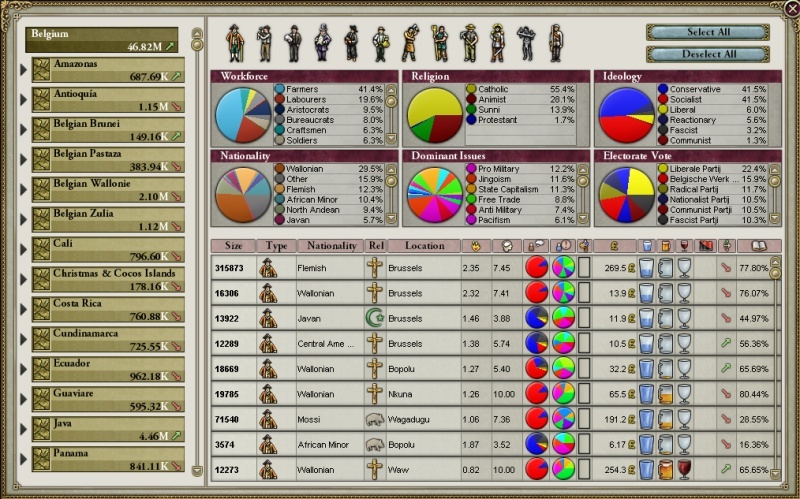
By the end of the game, the population's ideology was perfectly split between conservatism and socialism, with tiny percentages going to the other ideologies. But the fascist party is still in power, because fascists hate to let go.
(Leckan got his wish five-fold...)

By the end of the game, the population's ideology was perfectly split between conservatism and socialism, with tiny percentages going to the other ideologies. But the fascist party is still in power, because fascists hate to let go.
(Leckan got his wish five-fold...)

